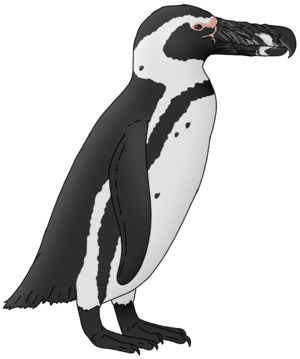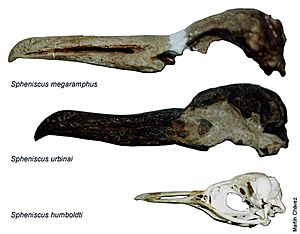Spheniscus megaramphus facts for kids
Spheniscus megaramphus (say: Sfen-ISS-kus Meg-uh-RAM-fuss) was an amazing penguin that lived a long, long time ago. It's an extinct species, which means it's no longer alive today. This special penguin lived during the Late Miocene period in what is now Peru, South America. It was famous for two things: being the biggest known type of banded penguin and having a really large beak!
Quick facts for kids Spheniscus megaramphus |
|
|---|---|
 |
|
| artistic reconstruction of Spheniscus megaramphus | |
| Scientific classification | |
| Genus: |
Spheniscus
|
| Species: |
megaramphus
|
Scientists first described S. megaramphus in 2003. A scientist named Marcelo Stucchi studied its fossils. These fossils were found in the Pisco Formation in southwestern Peru. The Pisco Formation is a special place where many ancient animal remains have been discovered.
Spheniscus megaramphus was much bigger than any banded penguins alive today. It stood about three feet tall! Its body was also stronger and more solid. The beak of S. megaramphus was super big compared to its head. It was even longer than its skull! This is different from the Humboldt penguin, a living banded penguin, whose beak and skull are about the same length.
S. megaramphus is just one of many extinct penguins found in the Pisco Formation. Other ancient banded penguins found there include S. muizoni and S. urbinai. Interestingly, S. urbinai was similar in size to S. megaramphus.
How This Penguin Lived

The large and unique shape of S. megaramphus's beak helped it hunt. Scientists believe it could catch and eat fairly large prey. Just like penguins today, S. megaramphus got its water from the fish and squid it ate.
Penguins live in salty ocean water. To deal with all that salt, they have a special organ called a salt gland. This gland helps filter out extra salt from their bodies. S. megaramphus had very large salt glands. This suggests that this ancient penguin spent a lot of its life out in the open ocean.
See also
 In Spanish: Spheniscus megaramphus para niños
In Spanish: Spheniscus megaramphus para niños
 | Laphonza Butler |
 | Daisy Bates |
 | Elizabeth Piper Ensley |

